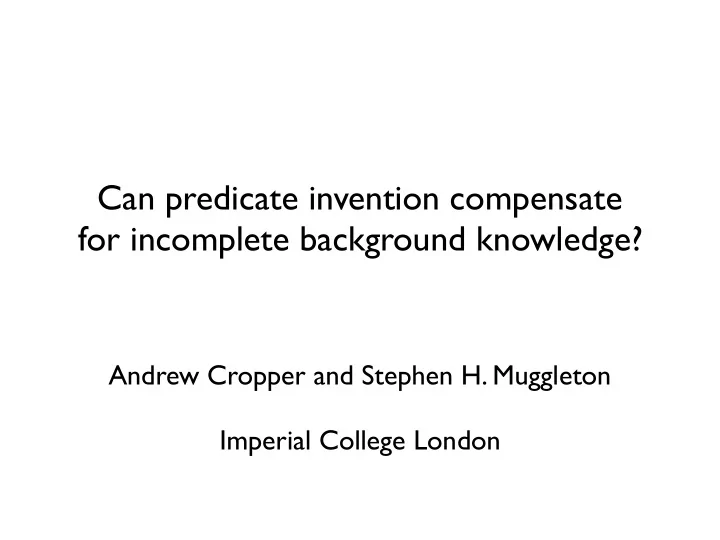

Can predicate invention compensate for incomplete background knowledge? Andrew Cropper and Stephen H. Muggleton Imperial College London
Incomplete background knowledge • missing values • missing predicates
Necessary predicate invention % background knowledge parent(amy,amelia) ← parent(gavin,amelia) ← % examples father(gavin,amelia) ← ← father(amy,amelia) % hypothesis
Necessary predicate invention % background knowledge parent(amy,amelia) ← parent(gavin,amelia) ← % examples father(gavin,amelia) ← ← father(amy,amelia) % hypothesis father(X,Y) ← parent(X,Y), p1(X). p1(gavin) ←
Necessary predicate invention % background knowledge mother(ann, amy) ← parent(ann,amy) ← father(john, amy) ← parent(john,amy) ← mother(amy, amelia) ← parent(amy,amelia) ← mother(amy, bob) ← parent(amy,bob) ← % examples grandparent(ann, amelia) ← grandparent(ann, bob) ← grandparent(john, amelia) ← grandparent(john, bob) ← % hypothesis
Useful predicate invention % background knowledge mother(ann, amy) ← parent(ann,amy) ← father(john, amy) ← parent(john,amy) ← mother(amy, amelia) ← parent(amy,amelia) ← mother(amy, bob) ← parent(amy,bob) ← % examples grandparent(ann, amelia) ← grandparent(ann, bob) ← grandparent(john, amelia) ← grandparent(john, bob) ← % hypothesis grandparent(X,Y) ← parent(X,Z), parent(Z,Y)
Useful predicate invention % examples % background knowledge grandparent(ann, amelia) ← mother(ann, amy) ← grandparent(ann, bob) ← father(john, amy) ← grandparent(john, amelia) ← mother(amy, amelia) ← grandparent(john, bob) ← mother(amy, bob) ← % hypothesis
Useful predicate invention % background knowledge % examples mother(ann, amy) ← grandparent(ann, amelia) ← father(john, amy) ← grandparent(ann, bob) ← mother(amy, amelia) ← grandparent(john, amelia) ← mother(amy, bob) ← grandparent(john, bob) ← % hypothesis grandparent(X,Y) ← mother(X,Z), mother(Z,Y) grandparent(X,Y) ← mother(X,Z), father(Z,Y) grandparent(X,Y) ← father(X,Z), father(Z,Y) grandparent(X,Y) ← father(X,Z), mother(Z,Y)
Useful predicate invention % background knowledge % examples mother(ann, amy) ← grandparent(ann, amelia) ← father(john, amy) ← grandparent(ann, bob) ← mother(amy, amelia) ← grandparent(john, amelia) ← mother(amy, bob) ← grandparent(john, bob) ← % hypothesis grandparent(X,Y) ← p1(X,Z), p1(Z,Y) p1(X,Y) ← mother(X,Y) p1(X,Y) ← father(X,Y)
Meta-interpretive learning MIL meta-interpreter Prolog meta-interpreter prove(true). prove([],G,G). prove((Atom,Atoms)):- prove([Atom|Atoms],G1,G2):- prove(Atom), call(Atom), prove(Atoms). prove(Atoms,G1,G2). prove(Atom):- prove([Atom|Atoms],G1,G2):- clause(Atom,Body), metarule(Name,MetaSub,(Atom:-Body)), prove(Body). abduce(Name,MetaSub,G1,G3), prove(Body,G3,G4). prove(Atoms,G4,G2). * S.H. Muggleton, D. Lin, and A. Tamaddoni-Nezhad. Meta-interpretive learning of higher- order dyadic datalog: Predicate invention revisited. Machine Learning, 100(1):49-73, 2015.
Learning great-great-grandparent (gggparent) relation in MIL without predicate invention gggparent(A,B):- father(A,C), father(C,D), father(D,B). gggparent(A,B):- father(A,C), father(C,D), mother(D,B). gggparent(A,B):- father(A,C), mother(C,D), father(D,B). gggparent(A,B):- father(A,C), mother(C,D), mother(D,B). gggparent(A,B):- mother(A,C), mother(C,D), mother(D,B). gggparent(A,B):- mother(A,C), mother(C,D), father(D,B). gggparent(A,B):- mother(A,C), father(C,D), mother(D,B). gggparent(A,B):- mother(A,C), father(C,D), father(D,B).
Learning great-great-grandparent (gggparent) relation in MIL with predicate invention p2 is invented grandparent relation gggparent(A,B):- p2(A,C), p2(C,B). p2(A,B):- p1(A,C), p1(C,B). p1(A,B):- father(A,B). p1(A,B):- mother(A,B). p1 is invented parent relation
Experiments - Hinton’s kinship
Experiments - custom kinship dataset
Learning robot plans Initial state Final state 3 3 2 2 1 1 0 0 0 1 2 3 0 1 2 3 [pos(robot,1/1),pos(ball,1/1)] [pos(robot,3/3),pos(ball,3/3)]
Plan learned with MIL p1 move(A,B):- p3(A,C),drop(C,B). p3(A,B):- grab(A,C), p2(C,B). p2(A,B):- p1(A,C),p1(C,B). p1(A,B):- forward(A,C),right(C,B).
Robot moving a ball - missing actions left/2 right/2 forwards/2 backwards/2 grab/2 drop/2
Plan learned with MIL p1 move(A,B):- grab(A,C), p4(C,B). p4(A,B):- p3(B,C). p3(A,B):- p2(A,C), p1(C,B). p2(A,B):- grab(A,C), p1(C,B). p1(A,B):- left(A,C), back(C,B).
Conclusions • Predicate invention can compensate for incomplete background information • Metagol (an MIL implementation) supports predicate invention • Suggests motivation to purposely predicates to improve efficiency, analogous to dimensionality reduction Future work • Naming invented predicates • Automate removal of redundant background predicates
Related work Missing data (feature based ML) • Ghahramani & Jordan (1995) • Marlin (2006) Incomplete background knowledge • Srinivasan, et al.,(1995) • Muggleton(2011) Effect of missing predicates • Liu and Zhong (1999) Compensating for incomplete background knowledge • Dzeroski (1993) Dimensionality reduction • Furnkranz (1997)
Thank you
Recommend
More recommend